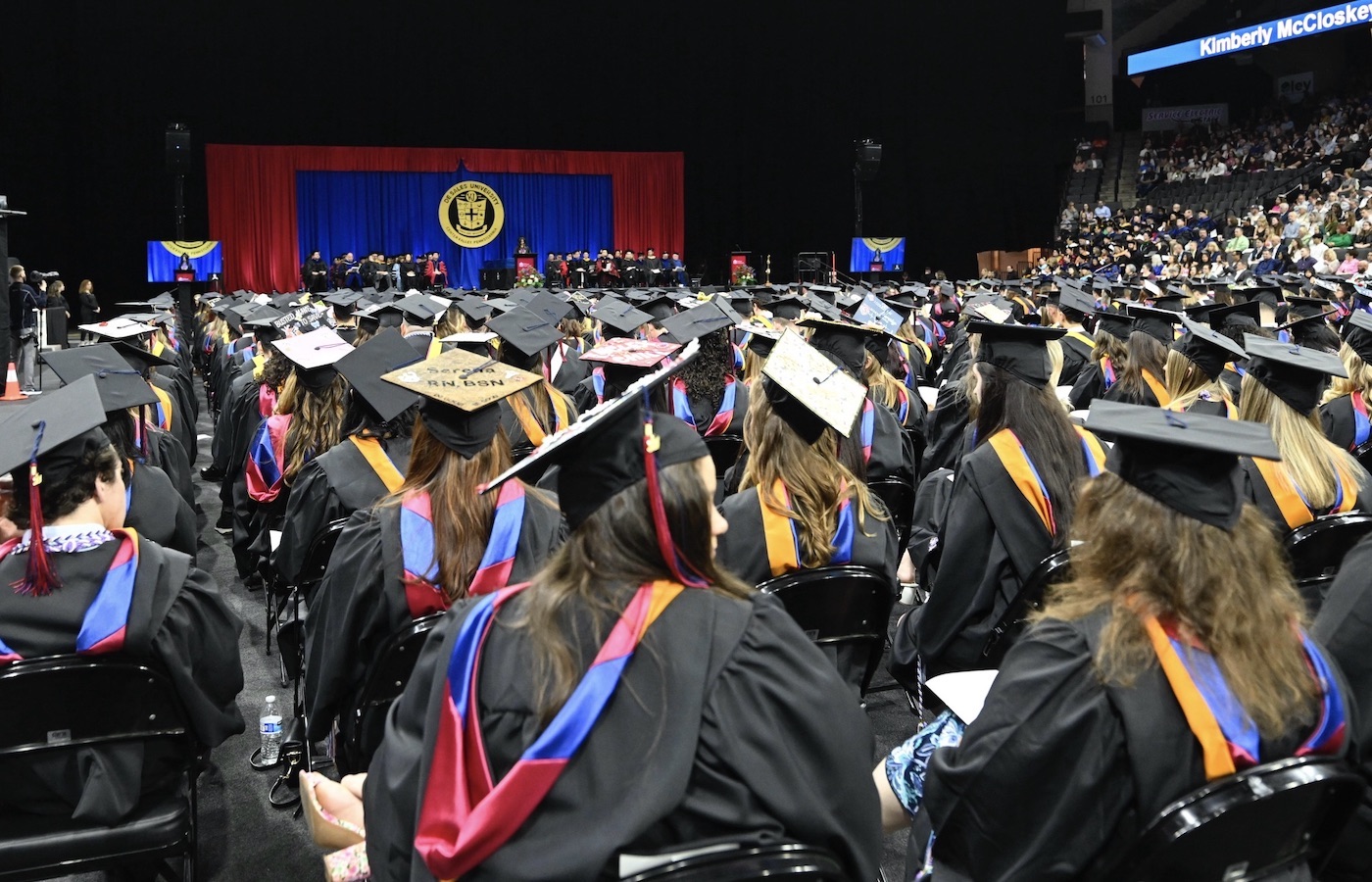History, Bachelor's , Minor
Overview
It might surprise you to learn that over 92% of our history graduates find employment within the first year after graduating.
With a DeSales history degree, you can do so much more than become a teacher or historian. Our students have gone on to become lawyers, financial advisors, government officials, priests, and so much more!
What can you do with a history degree?
With classes that focus on the themes of countries throughout the world, you'll have the knowledge to succeed in an ever-changing world. You'll gain the knowledge and critical skills needed to succeed in your preferred career path.
 History majors at DeSales can spend a semester studying abroad in a variety of places — for the same tuition!
History majors at DeSales can spend a semester studying abroad in a variety of places — for the same tuition!
Admissions Requirements
At DeSales, we not only look at your past academic achievement but also your potential for future growth to determine your admission.
We find that students who have demonstrated significant achievement within a demanding curriculum are best suited for academic life at DeSales. Quality of academic performance plays a critical role in the admissions decision making process. This helps indicate a student's potential for academic growth going forward. We welcome applications from all qualified students regardless of race, religion, sex, national, or ethnic origin.
Application Checklist
- Application Fee: None
- Transcripts: Official High School Transcript
- Standardized Tests: Test-optional, however, an Admissions Interview may be requested
- Recommendations: Completed Guidance Counselor Form and Teacher Recommendation Form
- Please refer to the Program Specific Requirements section for any requirements specific to this program
All materials can be mailed to:
DeSales University Admissions Office
2755 Station Ave.
Center Valley, PA
* SAT scores are highly recommended for students applying for the Nursing and Health Science programs. Please refer to the Program Specific Requirements section for any requirements specific to this program.
Additional recommendations
High School Academics - Remember, there is no single preferred high school academic program, but a college preparatory course of study is highly recommended. Here's an example:
- Four years of English
- Three or four years of college preparatory mathematics
- A minimum of two years of modern, foreign, or classical language
- At least two laboratory science courses
Visiting DeSales - A personal, on-campus interview is strongly recommended, but is not required. We encourage you to visit so that you'll have a chance to learn more about DeSales, and we'll have the opportunity to learn more about you, too.
Learn more about Undergraduate Admissions & Aid
When to Apply
We encourage you to apply early in your senior year. We use a rolling admissions system, which means you will be notified promptly about your admissions status—usually within four weeks of our receipt of your completed application.
Priority deadline for scholarship consideration is December 1 of your senior year.
Curriculum
As a History major, you will take courses in the history of the United States, Europe, and the wider world, and on themes such as piracy, war, religion, and economic booms and busts.
You'll learn about how things change and why people do what they do, drawing on the fields of psychology, political science, economics, technology, arts, and literature.
You'll also develop and nourish critical reading, analytical thinking, and effective communication skills — all of which will prepare you for your chosen profession and/or graduate school.
Advising is regular, one-on-one, and on-going. In 4 years, your class size will never exceed 35.
History for Business
The study of history can be wonderful preparation for a business career. Yes, business! In this track, you'll enhance your history courses with management, marketing, organization, accounting, and finance classes.
Pre-Law Track
Studying history is excellent preparation for law school. The JD is one of the most versatile graduate degrees in the United States today. Our graduates have gone on to study law at Notre Dame, Catholic University of America, Pennsylvania State University, Temple University, Widener University, and St. Thomas School of Law in Minnesota — in some cases with full scholarships!
STEP Track for High School Teachers
Our students make excellent teachers. They learn to teach to the whole person, not the subject matter and no more. In conjunction with the Department of Education, our history majors graduate in 4 years, certified to teach social studies at the secondary level, with a semester of student teaching experience completed.
Academic Catalog
Graduation Requirements
View the graduation requirements and example schedule for this programFaculty
Careers & Internships
Our students have the opportunity to intern all over the world.
Students have interned in archives in London, went on archeological digs in Rome, and worked for numerous local organizations—and received class credit for doing so!
In the last 15 years, our history majors have gone to work as:
- Educators
- Lawyers
- Marketers and Business Managers
- IT Consultants and Financial Advisors
- NGO researchers
- Government officials
- Emergency Medical Technicians
- Administrators for museums, schools, and tourist institutions
- Priests
DeSales faculty and advisers help our students with their school work, internships, study abroad, and networking for their next big step.
Tuition & Fees
DeSales can help make your college expenses affordable through a combination of grants, loans, student employment, and scholarship resources.
View a comprehensive list of financial aid forms and undergraduate program information sheets
Cost of attendance for undergrads for 2024-2025
Resident Students
Direct Costs
Tuition - $45,000
Room and Board - $13,800
Mandatory Fees - $1,800
One-time Orientation Fee for First-Year students and Transfers - $200
Total = $60,800 (including first-year/transfer fees)
Estimated Indirect Costs
Books/Supplies - $1,711
Personal Expenses - $4,605
Total cost for resident students: $67,116
Commuter Students
Direct Costs
Tuition - $45,000
Mandatory Fees - $1,400
One-time Orientation Fee for First-Year students and Transfers - $200
Total = $46,600 (including first-year/transfer fees)
Estimated Indirect Costs
Books/Supplies - $1,711
Personal Expenses - $4,605
Transportation Costs - $1,908
Living Expenses - $2,298
Total cost for commuter students: $57,122
Off-Campus*
Direct Costs
Tuition - $45,000
Mandatory Fees - $1,400
One-time Orientation Fee for First-Year students and Transfers - $200
Total = $46,600 (including first-year/transfer fees)
Estimated Indirect Costs
Books/Supplies - $1,711
Personal Expenses - $4,605
Transportation Costs - $1,908
Living Expenses - $9,192
Total cost for off-campus students: $64,016
*First-year students are required to reside on campus or commute from home.
Parking Fee - $100
View a comprehensive list of financial aid forms and undergraduate program information sheets
Dual Degree Undergraduate-to-Graduate Programs
If you are enrolled in an undergraduate-to-graduate degree program — for example a 5-year, 3+2, 3+3, program — the undergraduate tuition and fees apply only to the undergraduate portion of the program. As you progress into the graduate phase of your program, graduate tuition and fees apply. Please see your respective graduate program for more information.
The financial aid process may appear overwhelming at first glance, but don't worry, we'll help you through it.
Accepted students are automatically considered for scholarships upon receipt of a completed application and are awarded regardless of financial need. Funds for scholarships are limited, so we do encourage students to apply early.
Our comprehensive financial aid packages carefully explain the types and amounts of assistance —including federal, state, and institutional — that you may be eligible for to help cover education related expenses.
Total cost of attendance includes estimates for tuition, fees, room, board, books, and personal, transportation, and living expenses.
You can estimate your total cost of attendance with our Net Price Calculator






-yu.jpg?sfvrsn=4e55a435_0)


